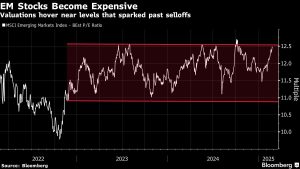
(Bloomberg) — European stocks declined on Monday as investors digested the results of the German elections, which left mainstream parties short of the votes needed to ease fiscal policy and lift the economy out of stagnation.
Most Read from Bloomberg
The Stoxx Europe 600 index slipped about 0.2% at the open. Germany’s DAX Index rallied as much as 0.8% before erasing most of the rise, while the euro trimmed an early advance.
Germany’s conservative leader Friedrich Merz emerged as the winner in Sunday’s election, but the results gave his Christian Democrat-led bloc just one clear path to power and they face intense pressure to move quickly to form a government. While the far-right Alternative for Germany, or AfD, doubled support to become the second-strongest party with 20.8%, it fell short of a blocking minority on its own.
The election comes at a delicate moment as Europe’s biggest economy contends with stagnating growth, Russia’s war in Ukraine and US President Donald Trump threatening a global trade war that could hobble Germany’s struggling industrial sector.
“Investors are perhaps slightly nervous to see how that new administration – once it’s formed — will deal with that fiscal backdrop,” said Jeremy Stretch, chief international strategist at Canadian Imperial Bank of Commerce.
In Asia, a blistering rally in Chinese technology shares took a breather on Monday after an executive order from President Donald Trump restricting Chinese spending on some strategic US sectors.
US equity futures edged higher, while Treasuries were little changed. A gauge of the dollar weakened.
One of the highlights of the week will be Nvidia Corp.’s earnings on Wednesday. Investors have started to boost bets that volatility will come back, with the tech firm’s results the first in a series of events with the potential to send the market into a tailspin.
Big Salvo
Regarding protectionism, Trump directed the Committee on Foreign Investment in the United States to restrict Chinese spending on technology, energy and other strategic sectors, his administration’s latest salvo against the world’s second-largest economy.
While not as enforceable as an executive order, the memo sets key “implementation guidelines to ensure that US investments and US investors are advancing US security and prosperity,” JPMorgan Chase & Co. strategists including Wendy Liu wrote in a note.

